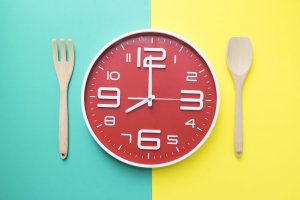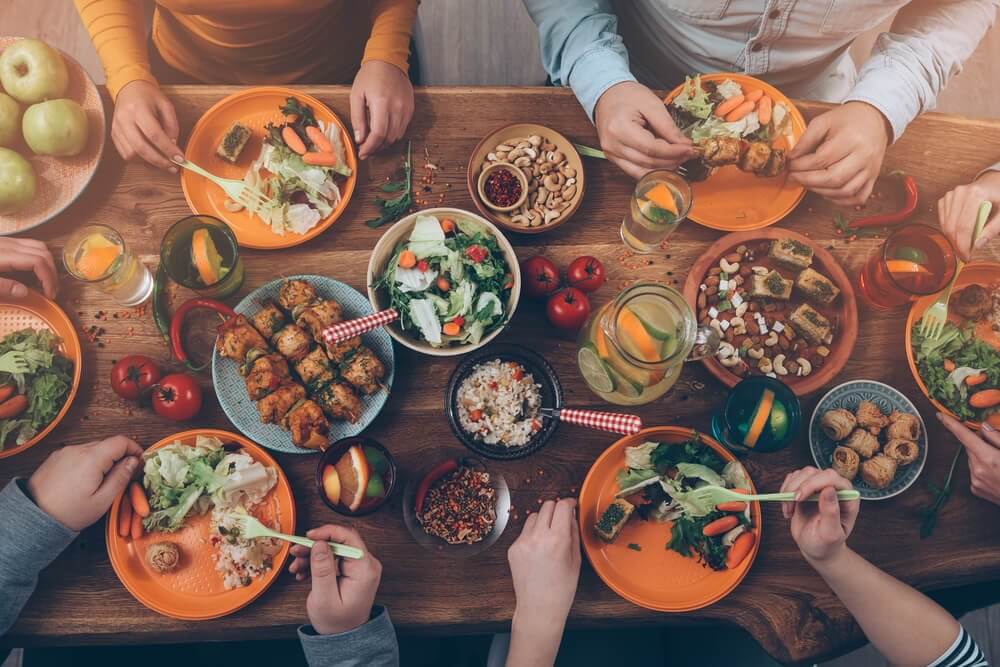When Is the Right Time to Eat?


Reviewed and approved by the pedagogue in physical education and nutritionist Elisa Morales Lupayante
In recent years, we’ve been advised to correct certain eating behaviors to improve the quality of our diets. Besides being encouraged to make good food choices, we’ve been told to eat more consciously. We’ve also been given suggestions regarding the right time to eat.
While it’s true that this schedule will depend largely on your own eating habits, there are certain ‘principles’ that you should respect. This means you’ll get the most out of your food as well as promote important functions, such as your metabolism.
The right time to eat
Recent studies have shown that the body’s circadian system primes the body to be more efficient at digesting, absorbing, and metabolizing food earlier in the day.
It seems that adapting to these routines could bring certain health benefits. On the other hand, disrupting these biological rhythms has been linked to metabolic dysfunctions associated with obesity, diabetes, and other disorders.
Another recommendation is to eat a greater number of small meals instead of three large ones. This keeps the metabolism active and reduces the tendency to eat poorly and in excess. A study published in the Journal of the Academy of Nutrition and Dietetics pointed out that:
“A larger number of small meals may be associated with improved diet quality and lower BMI. This may have implications for behavioral approaches to controlling the obesity epidemic”.
However, in recent years, some specialists have indicated that this statement may not always be valid. That’s because the most important thing is the overall total food intake at the end of the day. Therefore, it’s advisable to adapt the number of your daily meals to your own individual needs.
Meanwhile, there does seem to be a consensus on the advice to respect regular schedules. Let’s see what the recommendations are.
Breakfast within two hours of waking up

In a publication in the journal Circulation, the American Heart Association (AHA) noted that breakfast is the first meal of the day, which you should eat within two hours of waking up, usually between five a.m. and ten a.m.
However, some suggest that seven or eight a.m. is the most appropriate time to eat breakfast.
What should a good breakfast include? As you know, it’s the most important meal of the day, so it should be substantial. In fact, it should include fruit, grains, and a source of calcium. This will provide a complete and healthy breakfast.
Some people aren’t able to have breakfast due to the fact that they don’t have any appetite when they wake up. If you’re one of them, we recommend taking some time (showering, getting ready, etc) so that your body wakes up and you start to feel hungry. Drinking a glass of water can help.
Like this aritlce? You might also like to read: Do We Really Need to Eat Breakfast?
A mid-morning snack between breakfast and lunch
Once you’ve had breakfast, you might go to the gym or work, or may have other chores to carry out. At around ten or eleven o’clock, it’s a good idea to eat a little something. In fact, this is a perfect time to have some fruit, a cereal bar, or a yogurt with nuts. If you like, you can also have a cup of coffee.
However, whether you choose to have a mid-morning snack or not is a matter of personal choice. That said, having something light will help keep you full until mealtime. In addition, it’ll also give you a little more energy.
On the other hand, you might not find it necessary to have a snack at this time of day because you eat lunch earlier, have a bigger breakfast, or just aren’t hungry at this time of day. It really doesn’t matter so long as, by the end of the day, you’ve covered all your nutritional requirements.
Lunch between one o’clock and three o’clock

Eating before 1 p.m. isn’t recommended, unless, due to unavoidable circumstances, there’s no other alternative. The latest you should eat lunch is around three p.m.
For lunch, you must include some vegetables, proteins, healthy fats, vegetables, and carbohydrates. It should be a meal that satisfies you, but that isn’t too large as this could be counterproductive and take away your energy.
After the meal, for dessert, you can have something light, like another piece of fruit. You might also like a herbal tea. They aid your digestion and are soothing to your stomach.
A mid-after snack
Afternoon snacks aren’t just for children. Adults should also eat them. They help stave off hunger pangs until dinner time and stop you from snacking on unhealthy food.
A review published in the journal, Advances in Nutrition highlights that snacking on healthy food has the potential to add valuable nutrients to the daily diet. In addition, it increases feelings of fullness and contributes to a healthy weight. Nevertheless, as with the mid-morning intake, you can adapt it to your own personal circumstances.
The appropriate time to eat snacks is between four and five p.m. If you ate lunch at three p.m., you can extend this time until six p.m. Indeed, these hours are flexible and you can adapt them to your own lifestyle.
Dinner no later than nine p.m.

The appropriate time to eat dinner is between seven or eight p.m. and nine or ten p.m. It isn’t a good idea to eat any later unless you go to sleep really late. Remember that there should be at least two hours after you finish dinner before you go to sleep.
That’s because if you go to sleep on a full stomach, it’ll be hard to get to sleep, you’ll feel uncomfortable and, most likely, you’ll experience flatulence.
What’s more, according to recent data in the journal, Nutrients, eating late at night is associated with a higher percentage of body fat. In addition, people with this habit are more likely to eat large portions and energy-rich foods and have second helpings. In turn, they present more resistance to insulin and a higher cardiovascular risk.
We think you might also like to read this aritcle: The Best and Worst Foods for Your Digestion
Dinner should be light. For example, soup, fish, chicken breast, and vegetables are good options.
It should be a dinner that’s rich in vitamins and that’s light on your digestion. Some people just have a glass of milk or a small sandwich. This is also sufficient. Everyone’s needs are different.
The importance of eating at the right time
There are many factors to take into account when formulating a healthy diet. Usually, we talk about the quantity and quality of food. Now, we must also consider the time it’s eaten.
However, this is a new topic and much remains to be investigated. That said, it does seem possible that the timing and frequency of meals can have an impact on people’s health.
These recommendations are some of the most important but everything depends on your own individual requirements. What’s indisputable is that you should accompany them with a healthy lifestyle if you want to reap the benefits.
All cited sources were thoroughly reviewed by our team to ensure their quality, reliability, currency, and validity. The bibliography of this article was considered reliable and of academic or scientific accuracy.
- Aljuraiban, G. S., Chan, Q., Oude Griep, L. M., Brown, I. J., Daviglus, M. L., Stamler, J., … Frost, G. S. (2015). The Impact of Eating Frequency and Time of Intake on Nutrient Quality and Body Mass Index: The INTERMAP Study, a Population-Based Study. Journal of the Academy of Nutrition and Dietetics. https://doi.org/10.1016/j.jand.2014.11.017.
- Cameron J. D, Cyr M-J, Doucet E. Increased meal frequency does not promote greater weight loss in subjects who were prescribed an 8-week equi-energetic energy-restricted diet. British Journal of Nutrition. Abril 2010. 103 (8): 1098-101.
- Charlot A, Hutt F, et al. Beneficial effects of early-time restricted feeding on metabolic diseases: importance of aligning food habits with the circadian clock. Nutrients. Mayo 2021. 13 (5): 1405.
- Gracia-Arnaiz, M., & Arnaiz, M. G. (2010). De modernidades y alimentación: comer hoy en España. Horizontes Antropológicos, 16(33), 177–196. https://doi.org/10.1590/S0104-71832010000100010.
- Jiang P, Turek F. W. Timing of meals: when is as critical as what and how much. American Journal of Physiology, Endocrinology and Metabolism. Mayo 2017. 312 (5): E369-E380.
- Manoogian E. N, Chaix A, Panda S. When to eat: the importance of eating patterns in health and disease. Journal Biological Rhythms. Diciembre 2019. 34 (6):579-581.
- Njike VY, Smith TM, Shuval O, et al. Snack Food, Satiety, and Weight. Adv Nutr. 2016;7(5):866–878. Published 2016 Sep 15. doi:10.3945/an.115.009340
- Ochoa, F., & Ojeda, S. (2008). La mala alimentación y los estudiantes.
- Paoli A, Tinsley G, et al. The influence of meal frequency and timing on health in humans: the role of fasting. Nutrients. Abril 2019. 11 (4): 719.
- Quéliz, M. (2016). TRASTORNO DE HORARIOS – Consecuencias de comer a destiempo | Listín Diario. Retrieved from https://www.listindiario.com/la-vida/2008/06/09/61842/consecuencias-de-comer-a-destiempo.
- St-Onge, M. P., Ard, J., Baskin, M. L., Chiuve, S. E., Johnson, H. M., Kris-Etherton, P., & Varady, K. (2017). Meal Timing and Frequency: Implications for Cardiovascular Disease Prevention: A Scientific Statement from the American Heart Association. Circulation. https://doi.org/10.1161/CIR.0000000000000476.
This text is provided for informational purposes only and does not replace consultation with a professional. If in doubt, consult your specialist.








